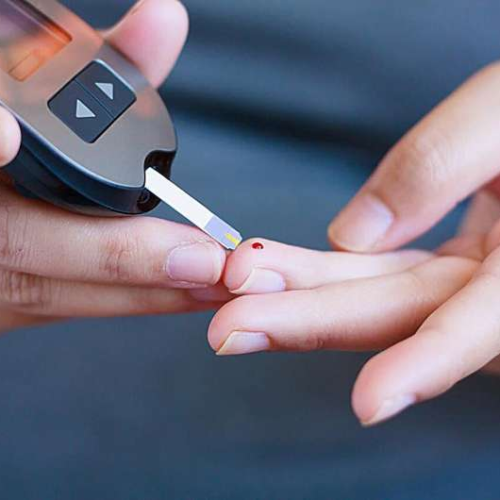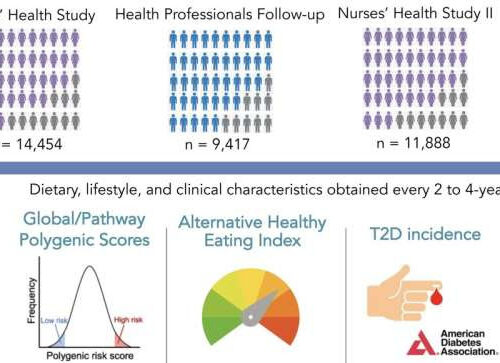Edited by Shrabasti Bhattacharya December 05, 2024 123 Added to Email Alert TOPLINE: Consuming five or more servings per week of dark chocolate is associated with a lower risk for type 2 diabetes (T2D) compared with infrequent or no consumption. Conversely, a higher consumption of milk chocolate does not significantly affect the risk for diabetes...
Tag: <span>diabetes risk</span>
Chronic steroid use could raise diabetes risk
September 10, 2024 by Dennis Thompson Taking steroids more than doubles a person’s risk of developing type 2 diabetes, a new study warns. Patients taking steroid pills, injections or infusions are 2.6 times more likely to develop diabetes than those not on steroids, researchers reported Sunday in a presentation at the annual meeting of the...
Study finds increased body and abdominal fat cause insulin resistance in teenagers, raising type 2 diabetes risk
by University of Eastern Finland Both total body fat mass and abdominal fat cause hyperglycemia, hyperinsulinemia, and insulin resistance, with abdominal fat doubling the risk of metabolic dysfunction. However, light physical activity can significantly reduce total body fat mass and insulin resistance. Credit: Andrew AgbajeHigh fat mass in adolescence causes insulin resistance, which can lead to...
Healthy plant-based diet reduces diabetes risk by 24%, finds study
by Medical University of Vienna Credit: Pixabay/CC0 Public Domain Many type 2 diabetes cases could be avoided by adopting a healthy lifestyle. A plant-based diet has been shown to play a key role in this. As demonstrated in a study led by Tilman Kühn from MedUni Vienna’s Center for Public Health, with limitations, a more plant-based...
Maternal vitamin D deficiency found to increase lifetime diabetes risk in offspring
by Jim Dryden, Washington University School of Medicine in St. Louis Top genes, networks, and pathways identified in transcriptome analysis of bone marrow from recipient mice transplanted with HSCs isolated from embryos from VD-sufficient and -deficient dams. VD(−) vs. VD( + ) FL-HSCs were transplanted into VD(+) mice, and global mRNA expression was evaluated by microarray in recipient...
Study finds how a genetic variant raises diabetes risk through an unexpected mechanism
by Andrea Tamayo, Broad Institute of MIT and Harvard Healthy fat cells, or adipocytes, with numerous fat deposits (green). Credit: Phil Kubitz, Claussnitzer lab Researchers have uncovered the mechanism through which a single DNA base change dramatically raises the risk of a subform of type 2 diabetes (T2D) called metabolically obese normal weight (MONW). This genetic variant,...
Some reduced-carb diets may decrease diabetes risk, but others may raise it
by Laura Williamson, American Heart Association News When it comes to reduced-carb diets, it may be quality, not quantity, that matters most. New research finds that animal-based, low-carbohydrate eating was associated with a higher Type 2 diabetes risk, whereas plant-based, low-carb eating was associated with a lower diabetes risk. The research, recently presented in Chicago...
Poor diet associated with increased diabetes risk across all gradients of genetic risk
by Public Library of Science Interplay between genetics and diet on the development of type 2 diabetes. Credit: Jordi Merino, Merino J. et al., 2022, PLOS Medicine, CC-BY 4.0 (creativecommons.org/licenses/by/4.0/) Genetic risk factors and diet quality are independently associated with type 2 diabetes; a healthy diet is linked to lower diabetes risk across all levels of...
Step Up: walking may reduce Type 2 Diabetes risk for adults 65 and older
UNIVERSITY OF CALIFORNIA – SAN DIEGO IMAGE: JOHN BELLETTIERE, PH.D., M.P.H. SENIOR AUTHOR AND ASSISTANT PROFESSOR OF EPIDEMIOLOGY AT THE HERBERT WERTHEIM SCHOOL OF PUBLIC HEALTH AND HUMAN LONGEVITY SCIENCE AT UC SAN DIEGO, AND COLLEAGUES WANTED TO KNOW WHETHER 10,000 STEPS A DAY IS NECESSARY FOR PEOPLE TO REDUCE THEIR RISK FOR DIABETES. CREDIT:...
Adding lean beef to a healthy diet does not adversely affect heart health or diabetes risk
Bloomington, Ind. and Chicago, Ill. — Results from a new study show that risk factors for cardiovascular disease and diabetes were similar when participants consumed a healthy US-style eating pattern with and without an additional 5.3 ounces of lean beef. The added beef replaced carbohydrates, primarily refined starches. All participants were considered at risk for...
- 1
- 2







